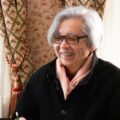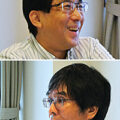Dialogue: Challenge by Tottori, the Least Populous Prefecture in Japan There is a Right Size for Democracy

Mt. Daisen, Tottori Prefecture
Motani Kosuke, Chief Senior Economist, The Japan Research Institute, Ltd. vs Hirai Shinji, Governor, Tottori Prefecture
Tottori, a Unique Countryside
Motani Kosuke: I read your book, Chiisakutemo Kateru (You Can Win Even if You Are Small). I think this book is like the novel, Shitamachi Roketto (Rockets of an Old Commercial District) by Mr. Ikeido Jun. It’s the story of a young man who grew up in Tokyo and migrated to Tottori. In the story, the protagonist leaves a large company, finds a job at a second-tier company and achieves success as a hired business manager with his strenuous efforts.
Hirai Shinji: Thank you, Mr. Motani. I’ve asked you for help in many ways, including a visit to a symposium held in our prefecture and guidance with our prefectural employees, because I really wanted to try what you called the capitalism of the satoyama woodlands in Tottori. It is just my interpretation, but what you intended to say was that the satoyama woodlands have things like water, food and energy that are absent in urban areas, and there are treasures and a new economy that is different from the monetary economy in the woodlands. We have tried to learn how we can achieve this kind of capitalism on our own terms.
Motani: Tottori Prefecture has a high capacity for gathering information. From way back, your prefecture has done many things before the rest of the country. In the field of ecotourism, Mt. Daisen in Tottori is one of the most advanced areas in Japan. Chizucho is also a Japanese pioneer in its attempts to bring people to the satoyama woodlands. Additionally, Tottori Prefecture has a public university devoted to environmental studies. I highly regard the fact that your prefecture established this university where students interested in environmental issues gather from all over Japan in the midst of the satoyama woodland.

View from the top of Mt. Daisen. The mountain is located in the Daisen-Oki National Park
Hirai: I think what Mr. Motani predicted is beginning to come to fruition. Our ways of thinking are changing considerably from old notions such as a monetary economy and the city-centered idea of bowing to the inevitable. I think Tottori Prefecture may be able to create a new wave in Japan by developing in this manner.
Motani: I found more convincing points outside of your book because I have visited Tottori many times myself. But I feel that Tottori is not well-known to most people in Japan. They just think of your prefecture as the average countryside.
Hirai: Tottori is not an average place. It’s a unique countryside.
Motani: That’s true. [Motani laughs.]
Hirai: I think the countryside in Japan has been too modest up to this point. I would like to reverse the traditional ideas of giving up because the scale is too small and losing hope because the area is not urban. In fact, resources are everywhere. They are in our mountains and on our beaches. There was a person who recently moved to Tottori Prefecture and found a forestry job because he wanted to go surfing regularly. In the summer, this person engages in forestry work and goes surfing in Tottori. In the winter, he takes advantage of the winter break and travels to the southern hemisphere for surfing. Such an idea is completely different from earning money by selling stocks and managing assets in a city.
Motani: People in Japan often say that the United States is money-centric, but it’s not that way for many people and regions there. Let me share this episode from my days at the University of California at San Diego. I asked my classmate, “Where is our professor?” The classmate replied, “He’s surfing over there. Hold on.” Many Americans are really enjoying the nature in their region. I think the southern tip of the state of New York is the only part of the United States that has an environment like Tokyo.
Hirai: I think the social structure in Japan has become distorted. Elderly people who continued to work until retirement age have a large savings. They leave that savings to their children as a legacy without spending it. People in Japan say structural social security reforms are necessary, but I truly believe we can give happiness a more balanced shape by thinking more about how to spend money and reconsidering the trade-off relationship between working, saving money and spending time on personal happiness. I think people in San Diego are doing that already. But people find it difficult to do the same thing in Tokyo. That’s why they are beginning to discover new advantages in the countryside.
Motani: Maintaining a balance is essential. But too many people go too far in their arguments. For example, they suddenly say, “There are no jobs in the countryside.” But I think there are jobs. In, my opinion, it’s manpower that is in short supply.
Hirai: Employment is spreading. The effective ratio of job vacancies to job applicants in Tottori Prefecture has surpassed 1.4 times.
Motani: That’s a serious manpower shortage.
Hirai: The ratio used to be 0.7 times or so. It has doubled. The ratio of job openings for applicants for permanent staff member positions also reached the highest level ever, above 0.8 times. Tokyo may be the place to be if you want to become a billionaire. But I think the countryside is the choice for those who seek a certain amount of money and a lot of happiness. As a matter of fact, trends are shifting. For example, about 20 percent of respondents living in urban areas expressed their desire to move when asked if they wished to move to a farming, mountain or fishing village in a survey that was conducted by the Cabinet Office 10 years ago. More than 30 percent of urban respondents choose the same answer in response to the same survey question today. The number of urbanites interested in moving to the countryside has been growing steadily. Around the time when I became the prefectural governor, people said that only senior citizens would come to Tottori, even if we campaigned for people to move to Tottori.
Motani: That part of your book was a true eye-opener for me. I didn’t know that the staff members in your prefectural government in those days were convinced that only elderly people would come from urban areas to Tottori.
Hirai: That’s right. There was a belief that said we should not encourage moving because the arrival of elderly people would create a financial burden. However, it turned out that moving centered on people in their 20s and 30s. I can tell you this based on the behavior of my own children, but these people belong to a generation of workers who will not merely toil away. They want to live more independently, instead of competing with others. That’s their way of thinking. Furthermore, they are looking for a better environment for raising their children. The countryside offers a better environment for raising children.
More Good Points of Japan Remain in the Countryside
Motani: Mr. Hirai, you were born in Kanda, Tokyo, older than me, and on the elite track. I find it significant for someone like you to say that. One of my own children entered a university in the countryside. I’m thinking that it would be nice if my other children go to the countryside, too. I’m thinking this way because there is no happiness or victory at the end of the fierce competition to get into a good school and a good company. Almost everyone at good companies ends up with a temporary transfer to another company midway through their career. Presidents and others who remain at their companies until the very end do not look happy at all. I feel that the idea of going to a city and surviving in a large Japanese organization is admirable may be a collective illusion. Becoming a winner in that way has no international currency. That winner will become a nobody without any work skills after retirement, too.
Hirai: I feel that things used be OK that way. But now I think I can understand very well why people come to Japan for sightseeing from countries like China and Singapore, where society is becoming more and more competitive. Japan offers those visitors something that their own countries are beginning to lose. I feel that the importance attached to the countryside is that missing something.
Motani: The economic development of Japan did not go as far as to destroy its countryside completely. Tottori Prefecture made an abandoned sector profitable ahead of other prefectures. Tottori is precisely the top runner in a group that is running one lap behind. Tottori is not the average countryside. The countryside comes in many varieties, but I think few prefectures in Japan chose to launch primary industry brands and develop them into a six-order industry (in which members of primary industries take charge of processing and sales) at a stage as early as Tottori.
Going back to the environment for raising children, as I mentioned earlier, I think it was also terrific for Tottori Prefecture to establish a structure for supporting nurseries without any classroom building or fixed program, known as Mori-no Yochien (Forest Kindergartens). The numbers of Mori-no Yochien are increasing all over Japan, but an overwhelming majority of local governments are instructing the administrators of these facilities to choose their registration status from either yochien (kindergartens) or hoikuen (day nurseries). By extending such instructions, they are asking Mori-no Yochien operators to build a classroom building. But Tottori Prefecture is making sure that its support goes to Mori-no Yochien, too, accepting their status as facilities that are neither yochien nor hoikuen. In this case, the local government is correcting the bureaucratic sectionalism of the central government.
As a matter of fact, a Mori-no Yochien local mother had independently created one in in another prefecture and received the compulsory instruction from the town authorities to choose the facility status of yochien. This instruction left the mother with no choice but to build a classroom building. I’m thinking about making a donation to her myself, because the mother has no money for the facility construction. I saw how Mori-no Yochien was received without a classroom building in her prefecture and realized how wonderful it would be if those authorities dealt with that case in the same way as Tottori Prefecture.
Hirai: Ways of doing things differ from one prefecture to another. In Tottori Prefecture, we are performing effectiveness measurements on children at Mori-no Yochien through a joint research project with Tottori University. We can tell from this project that Mori-no Yochien are properly developing their spirit of cooperation, physical strength and intelligence. We are planning to conduct a follow-up study on elementary school pupils who attended Mori-no Yochien in the future.
Branding Matsuba Crabs

Motani: I’d like to talk about the fishing industry, too. I thought matsuba crabs must be expensive like echizen crabs, because they are famous. But I realized matsuba crabs are not that costly.
Hirai: They are both zuwai gani (snow crabs). The same crabs are called matsuba crabs in the western region down to the San-in area. They are called taiza crabs in Kyoto Prefecture and echizen crabs in Fukui Prefecture, respectively. Matsuba crabs in Tottori are sold for prices at about half the cost of echizen crabs. Crabs in Fukui taste delicious for sure, but they are the same crabs and there is such a big gap in prices.
Motani: The gap comes from how the crabs are sold, doesn’t it?
Hirai: If anything, people in the San-in area were poor salespeople. Thinking that way, I changed the name we use for marketing, from Tottori Prefecture to Kanitori (Crab-Catching) Prefecture. We also decided to call the highest rank of matsuba crabs landed in Tottori Prefecture itsukiboshi (five shining stars).
Motani: When I travel around Japan, people all over tell me that the foods from their area are delicious, but inexpensive because they are unknown in urban areas. The people say this boisterously and proudly, but I think such statements reflect their self-derision and lack of motivation, instead of pride. I think people in local areas should strengthen their brands and increase their market shares in the same way as Tottori Prefecture.
Hirai: We live in an age when we sell our products to customers not only in Japan but also all over the world. We must develop our brands skillfully to accomplish this.
Motani: What you said reminds me of agriculture. In Japan, Tottori Prefecture and Yamagata Prefecture have focused on the cultivation of fruit from the early stages.
Hirai: Compared with the Hokuriku and Tohoku regions, where rice remains the overwhelming crop, Tottori has many types of garden produce and livestock products because the prefecture has pursued agricultural reforms. We have worked on developing many local specialties such as watermelons and Japanese pears.
Motani: Looking at the population composition by industry in the census, agriculture has the most elderly workers out of any industry in Japan. More than half of the people engaged in farming are 60 years old or older in many parts of the country. I think Tottori is a prefecture where the generational change is advancing relatively quickly with the employment of young people.
Hirai: Things began to move in a favorable direction four or five years ago. However, unsurprisingly, it’s difficult to maintain an agricultural population.
Motani: Currently more than half of the people engaged in farming are 60 years old or older. There is no way to prevent the farming population from shrinking with their retirement. The question is whether the population pyramid for agriculture has a bulge in the lower age bracket or not. If the pyramid has such a bulge, the pattern of change for the agricultural population will shift from a decrease to an increase one of these days.
Hirai: The number of young people doesn’t need to be that large. Agriculture changes when a certain number of people arrive and form a core.
Motani: You’re saying that newcomers and second- and third-generation farmers will create innovations and increase additional values. Am I right?
Hirai: There is a dairy cooperative called Daisen Nyugyo in Tottori. This cooperative is producing high-quality milk. Ice cream made by Daisen Nyugyo has been selling explosively at an upmarket department store in South Korea, known as Shinsegae.
Motani: Daisen Nyugyou is an advanced example of the globalization of a six-order industry, isn’t it? I think tourism is another field where Tottori Prefecture is advanced, from the viewpoint of globalization. Mt. Daisen is a famous peak, but it’s not well known to people in Tokyo. It’s been quite a long time since a large number of tourists began visiting this mountain from South Korea on mountain-climbing tours.
Hirai: I think the opening of a ferry route played a big part in that development.
Motani: Montbell, an operator of brand name outdoor equipment stores, opened its Daisen branch in a location where there is no other store. As it turned out, the branch achieved good sales.
Hirai: I understand that was the first store Montbell opened in the mountains. I heard that people within the company had a big discussion over whether or not a store established in such a location could achieve decent sales. But a sufficient number of people are shopping at this store daily, including people from abroad. With the Daisen branch as a model, Montbell began setting up stores on other mountains.
Motani: Montbell began establishing stores in resort areas, too. The company’s president told me that the success of the Daisen store surprised him, too.

Tottori Sand Dunes
Hirai: Resources in large cities and those in the countryside are different. Making the most of them, which direction to take must be different in large cities and the countryside, too. The Pokémon GO game shows that.
Motani: I thought the declaration of the Tottori sand dunes as a Pokémon GO Free Zone was a good idea. It made people playing the Pokémon GO game want to visit the Tottori sand dunes.
Hirai: Sales at a souvenir shop right outside the Tottori sand dunes rose about 37% just a month or so after we issued the declaration. To tell you the truth, the tourism industry is declining rapidly in the countryside as a result of decreasing sightseeing bus services. The sales growth of more than 30% is a miracle under such circumstances. People at that souvenir shop are rejoicing over the special Pokémon boom.
Motani: It’s a great achievement. I also admire your decision to adopt sales expansion as an indicator. Regular politicians and administrators talk about the number of increased customers. But the number of customers means nothing if they don’t spend a single yen. What’s more, you incorporated warnings for heatstroke and the protection of the natural environment into the declaration, and transmitted the image that Tottori is a place for enjoying Pokémon GO, in other words, it’s not a lawless zone, very well.
Hirai: The positive current of concerted public-private initiatives has started in a place a little out of the way. The Montbell store discussed just a while ago and a recently launched project for renewing a town at the starting point for a pilgrimage to Mt. Daisen demonstrate this.
The countryside taking the leadership
Motani: Your work, Chiisakutemo Kateru, is a book that not only politicians and administrators in the countryside but also their counterparts in the central government should read. A prefecture with the size of an ordinance-designated city called Tottori is doing what the national government has been unable to do ahead of others, with its top leader clearly articulating his intentions. I think office workers in your prefecture are having a hard time, but they are working out the details of those issues and persuading assembly members and all other stakeholders to do things that should be done across Japan ahead of others.
Hirai: I feel that might be the way forward for Japan. I think no reform will occur in Japan unless those of us in the countryside take the leadership and try to change the way things are in this country.
Motani: The establishment of a prefectural ordinance recognizing sign language as a form of language is an example in that respect. People who have involved themselves in politics with the intention to make changes must realize the harmful effects that the unofficial status of sign language has caused for a long time. Probably those who are lionized in the mass media do not realize its harmful effects. Or they know of them, but take no action because such a reform will be unpopular. In my opinion, people like that are not reformers.
Hirai: Reforms must start locally after all.
Motani: What people in our society call reforms have an aspect that resembles the story of Mito Komon, in which good prevails over evil, to describe it nicely, or authorities are attacked for amusement to put it in a bad way. I think genuine reforms mean we create something by ourselves as concerned parties or we enable things that should be done, instead of criticizing something. I think the revision of our prefectural ordinance for controlling dangerous drugs was precisely such a reform.
Hirai: Small entities can do those things better than large ones. They include small and medium enterprises, and small local governments. Talks about generalizations start when an experiment at those entities is successful.
Motani: To tell you the truth, I see your face quite often in places outside of Tottori. I always see you eating something in a photo report on a meeting about people involved in regional development where someone from Tottori gives an oral presentation on a self-organized event that drew dozens of people. The presenter happily describes the photo, saying that is our governor. I’ve experienced that at several meetings.
Hirai: [Hirai laughs without commenting.]
Motani: I think that’s important, though. You are encouraging people who are trying hard by showing up at those modest events, however brief your attendance might be. You just talked about small entities. Tottori is certainly a small prefecture with a population of 600,000. Is it the combination of the small number of residents and the authorities working in the prefecture that is enabling Tottori to do those things?
Hirai: I think so. Communication is impossible when the population is at the level of 10 million or five million. I can go and meet people trying hard in a community with 500,000 or 600,000 people. Those people can speak to me, too. I believe there is a right size for democracy. Larger is not better.
Motani: It may be better to divide the whole nation into smaller prefectures with a population of 500,000 or 600,000 each.
Hirai: As a matter of fact, democracy is easier to practice when the unit is smaller. An area with the size of Setagaya Ward (with a population of about 890,000) is probably the limit in that respect. I believe regional revitalization and the dynamic engagement of all citizens in the true sense of the word will start at the grassroots level. People in large cities are all aware of the limits they have reached. But they have not been able to take the first step. I think that’s the state of Japan today. A breakthrough has just begun.
Translated from “Taidan: Nihonichi Jinko no sukunai Tottoriken no Chosen ― Demokurashii niwa Tekiseikibo ga aru (Dialogue: Challenge by Tottori, the Least Populous Prefecture in Japan ― There is a Right Size for Democracy),” Chuokoron, November 2016, pp. 124-131. (Courtesy of Chuo Koron Shinsha) [November 2016]




